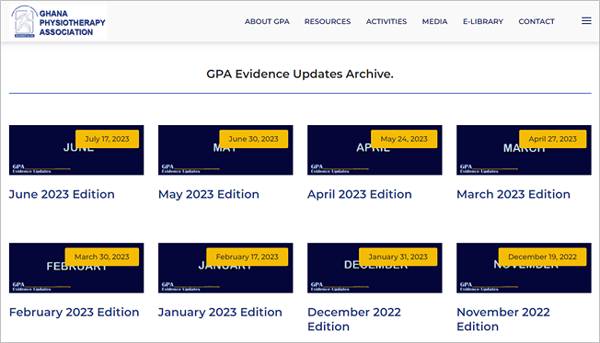Equitable rehabilitation: bridging the gap in accessing evidence in Ghana
Access to healthcare is a basic human right and no one should be deprived of quality healthcare for any reason. There is a need to ensure equal access to healthcare for all individuals, regardless of their geopolitical, socioeconomic or demographic status. According to the World Health Organization (WHO), health equity is defined as ‘the absence of unfair, avoidable or remediable differences among groups of people, whether those groups are defined socially, economically, demographically, or geographically or by other dimensions of inequality (e.g. sex, gender, ethnicity, disability, or sexual orientation)’.(para.1)
Globally, health equity is a major challenge for most lower- and middle-income countries (LMICs) and cuts across various spheres of life. To join the 2023 World Evidence-Based Healthcare (EBHC) celebrations in pushing the agenda on ‘evidence and global health equity’, the Evidence-based Practice (EBP) Research Group of the Ghana Physiotherapy Association (GPA) shares their contribution towards addressing health equity in Ghana. Hinged on the theme of ‘access and capacity’, the group discusses their initiatives in ensuring quality research evidence is more accessible to Ghanaian physiotherapists (GPA Evidence Updates); and equitable access to, engagement with, and use of digital infrastructure to promote EBP in Ghana (GPA Evidence Database).
The group was established in March 2022, following the creation and first publication of two EBP initiatives: the GPA Evidence Updates and GPA Evidence Database in February 2022. The GPA Evidence Updates contain summaries of current clinical practice guidelines and systematic reviews. The creation of these initiatives and launch of the group was previously reported in a blog during the 2022 World EBHC Day celebrations. As a group, our main goal is to promote EBP culture among Ghanaian physiotherapists and other rehabilitation professionals through research, training and advocacy to advance quality patient-centred care.
Monthly production of GPA Evidence Updates
As part of our mandate in promoting EBP culture among Ghanaian physiotherapists, we produce monthly research updates on four conditions: stroke, cerebral palsy, low back pain and Parkinson’s disease. These conditions are commonly seen within the Ghanaian physiotherapy context and present with significant disabilities that impact the quality of life of affected persons and their families. Stroke and Parkinson’s disease count among the three most common neurological conditions1 recorded in an adult neurology clinic in Ghana.
Cerebral palsy and low back pain remain the top paediatric and musculoskeletal conditions, respectively. While these research updates are compiled in the GPA Evidence Updates and emailed to all physiotherapists in Ghana, they are also archived on the association’s website (see Figure 1).

The evidence generated is also indexed in the GPA Evidence Database for continuous engagement and as a data source for quality research evidence to support physiotherapy practice and the wider rehabilitation community. More specifically, the purpose of implementing these EBP initiatives is to ensure that patients living with these conditions receive quality physiotherapy and other rehabilitation interventions based on current clinical practice guidelines and systematic reviews.
The group took this first step in bridging the gap in access to quality research evidence to ensure that Ghanaian physiotherapy practice is informed by sound and current research evidence. So far, the group has published 19 editions of the GPA Evidence Updates and has also ensured continuous updates of our growing evidence database of guidelines and systematic reviews (GPA Evidence Database).
The database currently has two guidelines and 102 systematic reviews for stroke, two guidelines and 51 systematic reviews for cerebral palsy, four guidelines and 111 systematic reviews for low back pain, and three guidelines and 96 systematic reviews for Parkinson’s disease. Above all, we believe this is a practical step towards ensuring health equity for Ghanaian patients accessing physiotherapy for these four conditions.
Research uptake and contextualisation
In our production and review of the monthly evidence updates, we identified that the majority of the clinical practice guidelines and systematic reviews do not contain evidence from Ghana, and have very limited evidence from Africa and other LMICs. While there is room for contextualisation of research findings, which is usually the pathway to utilisation of rehabilitation research evidence in Ghana, it also threatens the applicability of research findings within the local context, as not all evidence recommendations are available.
As a research group working within the Global South, we are well aware of the scarcity of home-grown research evidence within the region, which we are gradually working towards addressing through research capacity development using training, education, south–south and north–south collaborations.
The following were identified as possible reasons for these highlighted gaps:
- limited sources of research funding within the LMIC regions
- non-publication of the few manuscripts submitted to journals
- poor quality of research from the Global South limiting publication in high-impact journals
- inadequate clinical documentation to support research data gathering.
To help address these limitations, we have utilised various avenues within our means to ensure global health equity through:
- lifelong advocacy for appropriate clinical documentation through webinars
- raising national capacity-building for research through workshops and exploring topics, such as conducting and publishing quality research
- educative training activities on uptake, interpretation and contextualisation of research findings.
Recommendations
The group recommends the following towards promoting equitable global health:
- encourage Ghanaian physiotherapists and the global physiotherapy community, especially from Africa and other LMICs, to access our monthly evidence updates to guide practice
- encourage north–south research collaborations to produce quality research that will be eligible for publication in high-impact journals
- expand allocation of more research funding to the Global South.
Conclusion
Access and capacity-building in the use of evidence can play a significant role in ensuring equity in healthcare delivery, especially in LMICs like Ghana. Therefore, the EBP research group of the GPA is committed to promoting equity in global health through the continued production of our monthly evidence updates, training and collaborative research opportunities.
Reference
1. Sarfo FS, Akassi J, Badu E, Okorozo A, Ovbiagele B, Akpalu A. Profile of neurological disorders in an adult neurology clinic in Kumasi, Ghana. Eneurologicalsci. 2016;3:69-74.
Authors
Mary Wetani Agoriwo1,2,3, Adjoa Banson1,2,4 ,Martin Ackah1,5, Cosmos Yarfi1,2,6, Akua Afiriyie Bilson1,7, Hosea Boakye1,8, Beatrice Sankah1,9.
1. Evidence-based Practice Research Group, Ghana Physiotherapy Association, Ghana
2. University of Health and Allied Sciences, Ho, Ghana
3. Stellenbosch University, Cape Town, South Africa
4. University of Cape Town, Cape Town, South Africa
5. Northumbria University, Newcastle-Upon-Tyne, UK
6. University of the Western Cape, Cape Town, South Africa
7. The Trust Hospital Company Limited, Accra, Ghana
8. Boston University, London, UK
9. University of Southampton, Southampton, UK
Disclaimer
The views expressed in this World EBHC Day Blog, as well as any errors or omissions, are the sole responsibility of the author and do not represent the views of the World EBHC Day Steering Committee, Official Partners or Sponsors; nor does it imply endorsement by the aforementioned parties.
